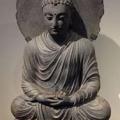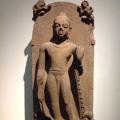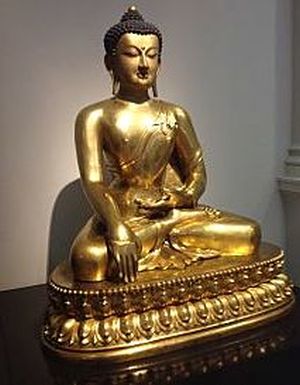44. It All Depends: Nagarjuna on Emptiness
Nāgārjuna founds the Mādhyamaka (“middle way”) Buddhist tradition by “relinquishing all views” and arguing that everything is “empty.”
Themes:
• K. Bhattacharya, E.H. Johnston and A. Kunst, The Dialectical Method of Nāgārjuna: Vigrahavyāvartanī (Delhi: 1986).
• S. Katsura and M. Siderits, Nāgārjuna’s Middle Way: Mūla-madhyamaka-kārikā (Boston: 2013).
• J. Ganeri, “Rationality, Emptiness, and the Objective View,” in Philosophy in Classical India (London: 2001), ch. 2.
• C.W. Huntington, The Emptiness of Emptiness: An Introduction to Early Indian Madhyamaka (Honolulu: 1989).
• R. Robinson, “Did Nāgārjuna Really Refute All Philosophical Views?” Philosophy East and West 22 (1972), 325-31.
• D. Ruegg, “Does the Mādhyamika have a Thesis and Philosophical Position?” in B.K. Matilal and R.D.G. Evans (eds), Buddhist Logic and Epistemology: Studies in the Buddhist Analysis of Inference and Language (Dordrecht: 1982), 229-38.
• P. Sagal, “Nāgārjuna’s Paradox,” American Philosophical Quarterly 29 (1992), 79-85.
• J. Walser, Nāgārjuna in Context: Mahāyāna Buddhism and Early Indian Culture (New York: 2005).
• J. Westerhoff, Nāgārjuna’s Madhyamaka. A Philosophical Introduction (Oxford: 2009).
• J. Westerhoff, “On the Nihilist Interpretation of Madhyamaka,” Journal of Indian Philosophy 44 (2016), 337-76.







Comments
Self and rebirth
Must say you've lost me @3 minute mark when you said that the Buddha concedes to there being a self when he speaks about rebirth, but only as a concession to conventional modes of thinking.
Not only can not-self be squared in with rebirth, but rebirth is a central doctrine of Buddhism. If you deny Buddhism rebirth, the whole philosophy falls apart, and Buddha was cut and dry on the idea that a materialistic death is a wrong view.
Most Buddhists do not believe that the talk about karma and rebirth is something handwaved in to please the masses, that is just a popular trend among some western "Secular" Buddhists. See the millions of Pure Land practitioners whose practice rests upon the idea that at death, they will be reborn in the Western Paradise of Amitabha so that they can reach enlightenment promptly.
In reply to Self and rebirth by Tadija
Self and rebirth
Oh yes, I agree with you about that - perhaps I put it in a misleading way but I was trying to say that in the ancient texts, it sometimes sounds as if rebirth is being described in a way that presupposes an enduring self. So the point is that if the Buddha doesn't always hasten to add "and don't forget there is no enduring self" every time rebirth is mentioned, that is just a matter of audience. It is, I think, widely taken for granted (as you say) that rebirth is a core part of Buddhism, the only question is how to account for rebirth on the various theories of (no-)self that the various Buddhists adopt.
The Skandas
We are the skandas. There is no "I".
There are only the skandas and the stream. There is not even an observer observing it. We are the "observing". We are a process that is happening, not an identity.
And that is okay. The stream is beautiful. The skandas are beautiful.
The cells are skandas. Everything, every component of a person is a skanda.
Skandas are streaming patterns, with matter coming in and out. Memory coming and going. Life coming in and out.
And we are those patterns.
The river that is us, is in a river. Buddhism teaches leaving passion behind. Looking only to the river.
This is senseless, to me. The stream is passion, it is life. Life lives it doesn't not live.
And life is meant to flourish. Education is flourishing. It satisfies the human curiosity, helps solve grief, gives new things to be passionate about.
And education is no institution or academic field. It is every life experience being questioned and reflected upon. This is what fills the good books. Not pedantry and pointless philosophy. Life.
Add new comment